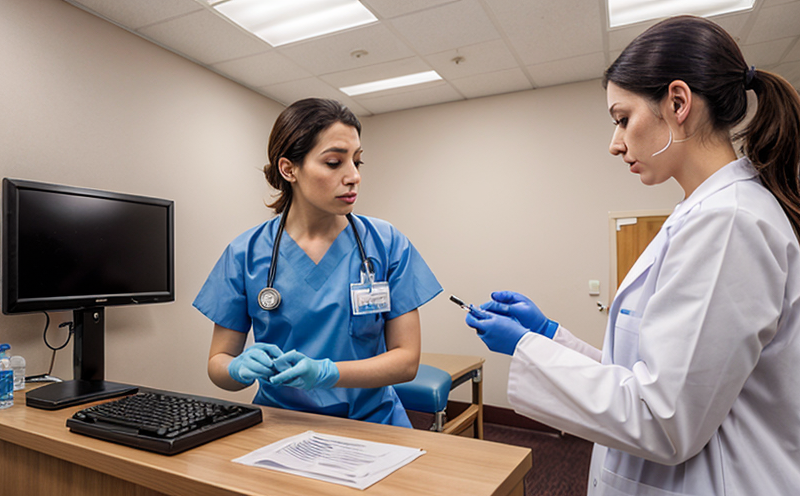Veterinary Carcinogenic Compound Testing in Animal Studies
Understanding and mitigating the potential carcinogenic risks of compounds used in veterinary medicine is crucial to ensuring both animal health and human safety. This service involves comprehensive testing procedures designed to identify whether a compound may cause cancer or other harmful effects when administered to animals. Our team specializes in conducting these tests using rigorous, internationally recognized standards that align with global regulatory requirements.
The process begins with thorough review of the compound’s chemical structure and its intended use in veterinary applications. Based on this information, we develop a tailored testing protocol aimed at assessing carcinogenic potential through various animal models. These may include rodent species (mice or rats) which are commonly used for such evaluations due to their genetic similarity to humans.
Following administration of the compound under controlled conditions, our laboratory monitors the animals closely over extended periods—often several generations—to observe any signs indicative of cancer development. This includes detailed pathological examinations and histopathological assessments. We also employ advanced imaging techniques like MRI or CT scans where necessary to provide comprehensive data on tumor growth patterns.
Our state-of-the-art facilities house specialized equipment capable of performing these tests accurately and efficiently. The use of cutting-edge technology ensures that results are reliable and reproducible, thereby enhancing the validity of our findings for regulatory approval purposes.
The outcome of this testing helps pharmaceutical companies make informed decisions about drug development or modifications needed before market release. By identifying potential hazards early on, we contribute significantly to improving product safety standards across industries dealing with animal health products.
Scope and Methodology
| Parameter | Description |
|---|---|
| Compound Type | Inorganic, organic, or synthetic compounds. |
| Animal Model | Rodents (mice and rats). |
| Testing Duration | Duration varies but typically extends over multiple generations of animals. |
| Data Collection Methods | Including pathological examinations, histopathological assessments, and imaging techniques. |
The testing process encompasses several key steps to ensure accurate assessment. Firstly, we conduct a thorough review of the compound’s chemical makeup and intended use in veterinary applications. This step is critical as it sets the foundation for developing an appropriate testing protocol tailored specifically towards evaluating carcinogenic risks.
Following this initial evaluation, compounds are administered under controlled conditions to groups of animals selected based on their suitability as models for human physiology. Throughout the study period, which can last several generations depending on the compound being tested, continuous monitoring takes place using various methodologies such as detailed pathological examinations and histopathological assessments.
Advanced imaging technologies may also be employed if required, providing valuable insights into tumor growth patterns within treated animals. All collected data is meticulously analyzed before final reports are prepared detailing our findings regarding carcinogenic potential.
Quality and Reliability Assurance
Our commitment to excellence in veterinary carcinogenic compound testing extends beyond merely performing tests; it includes implementing stringent quality control measures throughout the entire process. We adhere strictly to international standards such as ISO, ASTM, EN, IEC, and others relevant to our field.
To maintain high levels of reliability and consistency in our results, we follow strict protocols for sample preparation and handling, ensuring that each step is conducted meticulously by trained personnel using validated methods. This approach not only enhances the accuracy of test outcomes but also contributes to building trust among our clients who rely on us for accurate assessments.
Furthermore, regular internal audits are conducted to verify adherence to these procedures. By doing so, we can identify any potential areas needing improvement and implement corrective actions promptly. External accreditation bodies periodically review our operations against established criteria to ensure ongoing compliance with industry best practices.
Customer Impact and Satisfaction
- Enhanced safety profile of veterinary products through early identification of potential carcinogens.
- Informed decision-making for pharmaceutical companies regarding drug development or modifications required before market release.
- Compliance with regulatory requirements ensuring adherence to international standards.
- Increased confidence among consumers knowing that they are using safe and effective animal health products.
The impact of our testing services reaches far beyond just the immediate stakeholders involved in drug development. By providing reliable data on carcinogenic compounds, we help foster an environment where innovation can thrive without compromising public health or welfare standards.
Client satisfaction is paramount to us, and we strive to meet expectations by delivering high-quality results consistently across all projects. Positive feedback from satisfied customers reflects their appreciation for our expertise in this area and reinforces our reputation as a leading provider of veterinary carcinogenic compound testing services.





